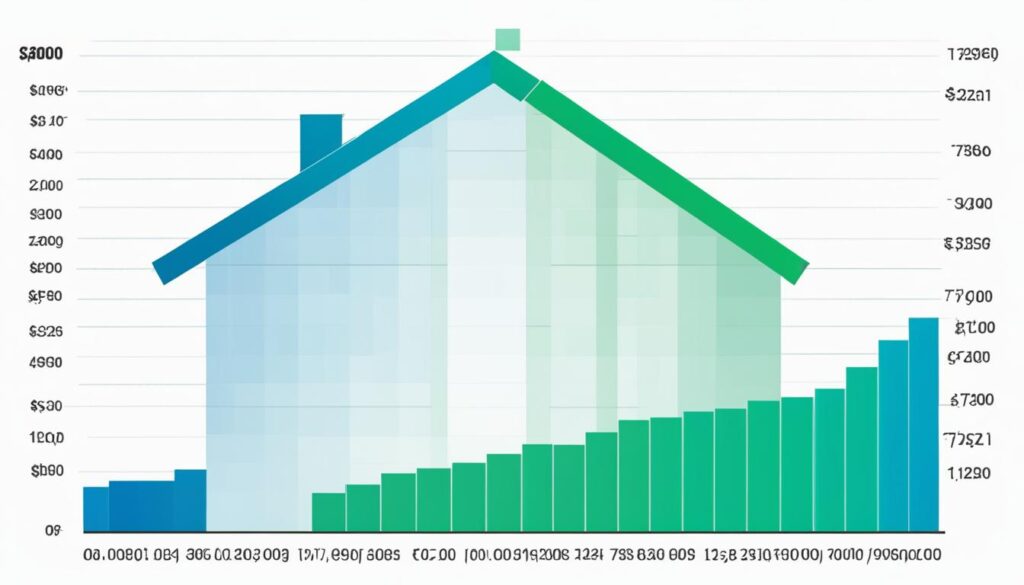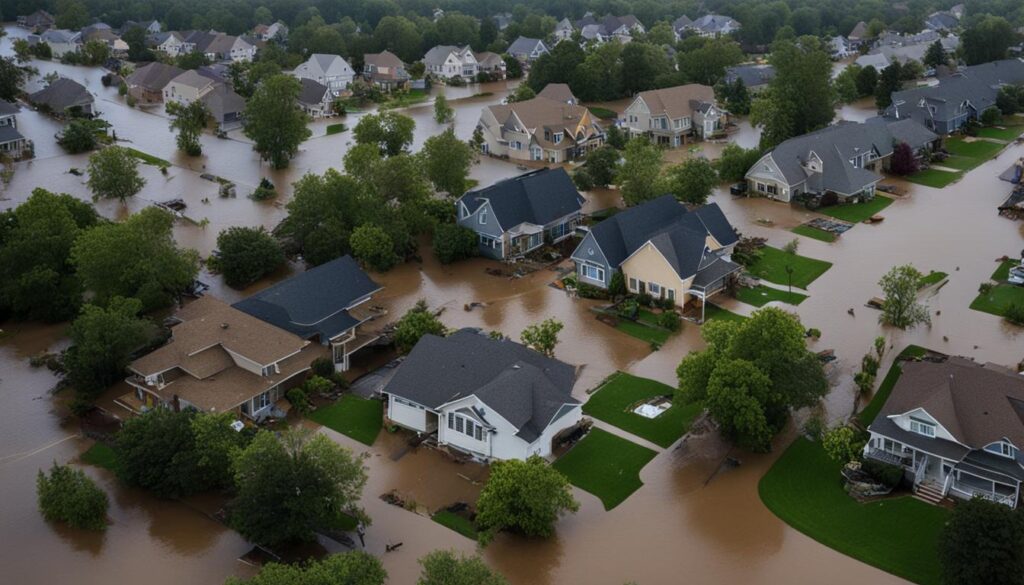Protecting one’s home is essential for ensuring the security and stability of one’s future. Mortgage protection payment insurance, also known as mortgage life insurance, offers homeowners the peace of mind that their loved ones will be able to remain in their family home in the event of unexpected death or disability. This specialized insurance policy pays off the remaining mortgage balance if the policyholder passes away or becomes disabled, providing financial security during a challenging time.
Key Takeaways:
- Mortgage protection payment insurance provides peace of mind by securing the future of your home.
- This insurance policy pays off the remaining mortgage balance in the event of unexpected death or disability.
- Mortgage protection insurance offers guaranteed acceptance without a medical examination.
- Consider the cost of mortgage protection insurance compared to traditional life insurance.
- Assess your individual circumstances to determine if mortgage protection insurance is the right choice for you.
What is Mortgage Protection Insurance?
Mortgage protection insurance, also known as mortgage life insurance, is a specific type of insurance policy designed to pay off the remaining mortgage balance if the policyholder passes away unexpectedly or becomes disabled. It provides financial security and peace of mind to homeowners by ensuring that their loved ones can remain in their family home even in difficult circumstances. Unlike traditional life insurance policies, mortgage protection insurance offers guaranteed acceptance without the need for a medical examination or health screening.
One of the key benefits of mortgage protection insurance is its coverage for death and disability. In the unfortunate event of the policyholder’s passing, the insurance policy pays off the remaining mortgage balance, relieving the family of any financial burden associated with the home loan. Additionally, if the policyholder becomes disabled and is unable to work, the insurance provides income replacement to help cover mortgage payments and other expenses.
Furthermore, some mortgage protection insurance policies also offer coverage for unemployment. This means that if the policyholder loses their job involuntarily, the insurance can help with mortgage payments for a certain period of time, providing crucial support during periods of financial instability.
It is important to note that mortgage protection insurance focuses solely on paying off the mortgage balance and does not provide direct financial support to the policyholder’s loved ones. However, by eliminating the mortgage debt, it frees up resources for the family to use as they see fit, whether it’s covering daily expenses, funding education, or saving for the future.
When considering mortgage protection insurance, it’s essential to carefully review the terms and conditions of the policy, including coverage limits, exclusions, and any additional features or riders. Comparing different insurance options and consulting with a knowledgeable insurance professional can help homeowners make an informed decision and find the policy that best suits their needs.
What Does Mortgage Protection Insurance Cover?
Mortgage protection insurance provides coverage for various situations to ensure homeowners and their loved ones are financially protected. Let’s take a closer look at the specific areas this insurance can cover:
1. Death Coverage
Mortgage protection insurance offers a death benefit that pays off the remaining mortgage balance in the event of the policyholder’s death. This coverage provides peace of mind to homeowners, knowing that their loved ones will not be burdened by the mortgage.
2. Disability Coverage
In the unfortunate event of a disability, mortgage protection insurance can provide coverage by paying off the mortgage balance. This ensures that homeowners are not financially overwhelmed and can focus on recovery without the added worry of mortgage payments.
3. Unemployment Coverage
Some mortgage protection insurance policies offer coverage for unemployment. In the event of job loss, the policy can help cover mortgage payments for a specified period, providing an essential safety net during a challenging time.
4. Refund Option
Certain mortgage protection insurance policies may also provide a refund option. This allows homeowners to receive a portion of their premiums back if they haven’t made a claim after a specific period. The refund option provides flexibility and added value to policyholders.
It’s important to review the terms and conditions of each mortgage protection insurance policy to understand the specific coverage details and any limitations. This will ensure homeowners make informed decisions to protect their financial well-being.

Understanding Mortgage Insurance Types: MPI vs. PMI vs. MIP
When it comes to mortgage insurance, it’s crucial to understand the different types available to homeowners. In this section, we’ll delve into the distinctions between Mortgage Protection Insurance (MPI), Private Mortgage Insurance (PMI), and Mortgage Insurance Premiums (MIP).
Mortgage Protection Insurance (MPI) should not be confused with Private Mortgage Insurance (PMI). PMI is typically required for conventional loans with less than a 20% down payment, and it protects the lender in the event of loan default. On the other hand, MPI, also known as mortgage protection insurance, provides homeowners with a safety net by paying off the remaining mortgage balance if the policyholder dies or becomes disabled.
To further clarify, let’s take a look at a comparison table:
| Mortgage Insurance Type | Description |
|---|---|
| Private Mortgage Insurance (PMI) | A type of insurance required for conventional loans with less than a 20% down payment to protect the lender against loan default. |
| Mortgage Protection Insurance (MPI) | Also known as mortgage life insurance, MPI pays off the remaining mortgage balance if the policyholder dies or becomes disabled. |
| Mortgage Insurance Premiums (MIP) | Required by the Federal Housing Administration (FHA) for certain loans, MIP protects lenders against default and enables borrowers to obtain financing with a lower down payment. |
It’s important to note that Mortgage Insurance Premiums (MIP) refer specifically to the insurance required by the Federal Housing Administration (FHA) for certain loans. MIP safeguards lenders against borrower default and allows individuals to secure financing with a lower down payment.
Understanding the differences between these mortgage insurance types can help homeowners make informed decisions about the protection they need for their properties.
Does Standard Life Insurance Cover Your Mortgage?
When considering how to protect your mortgage, it’s essential to understand the coverage options provided by standard life insurance. Standard life insurance policies offer financial protection for your loved ones in the event of your death. While such policies generally do not specifically cover mortgage payments or pay off your mortgage directly, they can still provide valuable benefits that can help secure your family’s financial future.
There are two main types of standard life insurance policies: term life insurance and permanent life insurance. Let’s explore each type and how they can offer protection:
Term Life Insurance
Term life insurance provides coverage for a specific period, usually ranging from 10 to 30 years. If you pass away during the policy term, your beneficiaries will receive a death benefit that can be used to pay off the mortgage or cover other financial obligations. Term life insurance is generally more affordable than permanent life insurance, making it a popular choice for those seeking budget-friendly coverage.
Permanent Life Insurance
Permanent life insurance provides lifelong coverage as long as you continue paying the premiums. This type of policy accumulates cash value over time, which you can borrow against or withdraw to supplement your retirement income or pay off your mortgage. While permanent life insurance offers additional benefits, such as potential tax advantages and lifelong coverage, it is generally more expensive than term life insurance.
Note: It is essential to consult with a licensed insurance professional to determine the best insurance policy for your specific needs and financial goals. They can guide you through the decision-making process and help you understand the advantages and limitations of each type of policy.
While standard life insurance does not directly cover your mortgage, the death benefit provided by these policies can be used by your beneficiaries to pay off the mortgage or meet other financial obligations, providing financial security and peace of mind.

| Pros of Standard Life Insurance for mortgage protection | Cons of Standard Life Insurance for mortgage protection |
|---|---|
| Provides financial protection for your loved ones | Does not directly pay off the mortgage |
| Offers flexibility with term and permanent life insurance options | May require medical underwriting and health screenings |
| Death benefit can be used to pay off the mortgage | Permanent life insurance can be more expensive |
While standard life insurance offers valuable benefits, it’s important to assess your individual circumstances and financial goals. Consider factors such as the amount of coverage needed, the length of coverage required, and affordability. Comparing various insurance options, including mortgage protection insurance, can help you make an informed decision that provides the best protection for your mortgage and your family’s future.
Is Mortgage Protection Insurance Worth It?
Whether you should invest in mortgage protection insurance depends on your individual circumstances. While it offers peace of mind and ensures financial security for your loved ones, there are alternative options to consider, such as term life insurance.
Term life insurance provides affordable coverage with a fixed death benefit that can be used to cover various expenses, including your mortgage. It offers flexibility and allows you to choose a policy term that aligns with your needs and budget.
By comparing insurance options, you can determine which type of coverage best suits your situation. Term life insurance allows you to tailor the coverage amount and duration to match your mortgage amount and term, providing comprehensive protection at an affordable cost.
“Term life insurance offers an affordable and flexible solution for homeowners looking to secure their mortgage and provide financial protection to their loved ones.”

By opting for term life insurance, you can have the peace of mind that your mortgage will be covered in the event of your untimely passing. This type of insurance offers affordable monthly premiums and ensures that your loved ones can remain in the family home without financial burdens.
When comparing insurance options, it’s important to evaluate the cost, coverage, and benefits provided by each policy. Assess your financial situation, future plans, and risk tolerance to determine the most suitable coverage option for you.
Summary:
- Mortgage protection insurance offers peace of mind and financial security.
- Term life insurance provides affordable coverage and flexibility.
- Comparing insurance options helps determine the best coverage for your needs.
Evaluating Your Home’s Risk to Natural Disasters
Evaluating the risk factors for natural disasters is crucial to protecting your home and ensuring you have the right home insurance coverage. By understanding the potential risks specific to your area, you can make informed decisions about the type and extent of coverage you need. One valuable tool for assessing these risks is the National Risk Index.
Also Read:- Navigating Life’s Journey With Continental Life Insurance
The National Risk Index, provided by the Federal Emergency Management Agency (FEMA), offers a comprehensive overview of the likelihood of various natural disasters at the county or census tract level. This index takes into account multiple factors such as hurricanes, wildfires, tornadoes, and coastal flooding. By accessing the National Risk Index, homeowners can assess the vulnerability of their properties to these specific hazards and take appropriate measures to reduce their risk.
Using the National Risk Index to Evaluate Your Home’s Risk
When evaluating your home’s risk to natural disasters using the National Risk Index, you can gain valuable insights into the specific hazards you may face. This information can help you determine the most effective ways to protect your home and secure the right home insurance coverage.
“The National Risk Index provides homeowners with a valuable tool for understanding their risk to natural disasters. By evaluating the data provided by FEMA, homeowners can make informed decisions about insurance coverage and take steps to mitigate potential risks.”
For example, if your area has a high risk of hurricanes, you may need to consider additional coverage for wind and water damage. If you live in a region prone to wildfires, you might want to explore insurance options that cover fire damage and provide financial support for rebuilding. By considering the specific risks identified by the National Risk Index, you can ensure your home insurance policy adequately protects your property.
Understanding the Importance of Risk Evaluation
Conducting a thorough risk evaluation is essential for homeowners because it allows them to anticipate and plan for potential natural disasters. By evaluating your home’s risk factors and considering the historical trends identified by the National Risk Index, you can make informed decisions about necessary precautions, insurance coverage, and even home modifications to minimize potential damage.
Ultimately, taking proactive steps and securing the right home insurance coverage can provide you with peace of mind and financial protection in the event of a natural disaster.

| County | Hurricane Risk | Wildfire Risk | Tornado Risk | Coastal Flooding Risk |
|---|---|---|---|---|
| County A | High | Low | Low | Medium |
| County B | Low | High | Medium | High |
| County C | Medium | Medium | High | Low |
Buying the Right Insurance Coverage
After evaluating your home’s risk factors, it is crucial to ensure that you have the appropriate insurance coverage. While homeowners insurance typically covers damage caused by fire and wind, it may not provide coverage for external flooding sources or earthquakes. To protect your home fully, you may need to consider purchasing separate policies such as flood insurance or earthquake insurance to secure coverage for these specific risks.
When shopping for insurance coverage, there are several key factors to consider:
- Coverage Limits: Review the coverage limits of the insurance policies you are considering. Ensure that the limits are adequate to fully protect the value of your home and its contents.
- Deductibles: Understand the deductibles associated with the policies. A deductible is the amount you must pay out of pocket before your insurance coverage kicks in. Consider your financial situation and choose a deductible that you can comfortably afford.
- Dwelling Coverage: Verify that the insurance policies provide sufficient dwelling coverage. Dwelling coverage protects the structure of your home, including the walls, roof, and foundation. It is essential to have enough dwelling coverage to rebuild your home in case of a total loss.
By carefully evaluating and comparing different insurance options, you can make an informed decision and secure the right coverage to protect your home and belongings.

“Having the right insurance coverage is crucial to safeguard your home from unexpected perils. Take the time to understand the coverage limits, deductibles, and dwelling coverage provided by different policies. Don’t forget to explore the options for flood insurance and earthquake insurance to ensure comprehensive protection for your home.”
Making Your Home More Resilient to Disasters
In addition to having insurance coverage, taking proactive steps to safeguard your home against various disasters is crucial in minimizing potential damage. By implementing preventive measures, you can protect your property, belongings, and loved ones. Here are some effective strategies to consider:
Flood Prevention:
- Elevate electrical systems and appliances above the ground level.
- Install flood-resistant barriers, such as sandbags or flood shields, around entry points.
- Seal cracks in the foundation and walls to prevent water seepage.
- Ensure proper drainage around your property to redirect water away from your home.
Wildfire Mitigation:
- Create a defensible space by removing flammable vegetation and debris within 30 feet of your home.
- Choose fire-resistant materials for your home’s exterior, such as metal roofing and non-combustible siding.
- Regularly clean gutters and rooftops to prevent the accumulation of dry leaves and debris.
- Trim tree branches that overhang or touch your house.
Windstorm Protection:
- Reinforce windows and doors with impact-resistant materials or install storm shutters.
- Secure or anchor outdoor furniture, structures, and equipment to prevent them from causing damage during high winds.
- Inspect and maintain your roof regularly to ensure it can withstand strong winds.
- Survey your property for weak or damaged trees and remove them to minimize the risk of falling branches.
Implementing these measures can significantly enhance the resilience of your home. Consult with professionals in each area of disaster prevention to ensure you make the most effective choices for your home.
Guild Mortgage’s Home Loan Guarantees
Guild Mortgage is committed to helping homebuyers realize their dreams of homeownership by providing a range of home loan guarantees. These guarantees are designed to offer additional confidence and support throughout the mortgage process. Whether you are a first-time homebuyer or looking to refinance, Guild Mortgage offers the following guarantees:
- Credit Approval Protection: Guild Mortgage guarantees that once your loan has been pre-approved, your credit score will not negatively affect the outcome of your loan application.
- Closing Time Guarantee: Guild Mortgage understands the importance of a timely closing process. With their closing time guarantee, they ensure that your loan will close on time, as agreed upon in the purchase contract.
- Interest Rate Lock: Guild Mortgage offers the option to lock in your interest rate during the loan process, providing you with peace of mind and protection against potential rate increases.
- Refinancing Options: Guild Mortgage provides a variety of refinancing options to meet your needs and financial goals. Whether you are looking to lower your monthly payment, shorten the term of your loan, or tap into your home’s equity, Guild Mortgage can help.
With Guild Mortgage’s home loan guarantees, you can confidently navigate the mortgage process, knowing that you have additional protection and support every step of the way.
In the next section, we will explore the conclusion of our article, summarizing the key points we have covered regarding mortgage protection payment insurance, home security, insurance coverage, disaster resilience, and loan guarantees.
Conclusion
Mortgage protection payment insurance not only provides homeowners with financial security but also offers peace of mind by ensuring that their loved ones can continue living in their family home in the event of unexpected death or disability. When choosing insurance coverage, it is crucial to carefully evaluate options, taking into consideration factors such as cost, coverage limits, and individual circumstances.
Alongside mortgage protection payment insurance, homeowners should also prioritize home security and disaster resilience. Evaluating the risk factors for natural disasters and buying the right insurance coverage, including flood and earthquake insurance, can help protect your home against potential damages. Additionally, taking steps to make your home more resilient, such as implementing flood prevention and wildfire mitigation measures, can further minimize risks.
For those seeking homeownership, Guild Mortgage’s home loan guarantees offer additional confidence and support. With benefits such as credit approval protection, closing time guarantee, interest rate lock, and refinancing options, Guild Mortgage provides a comprehensive package to help you secure your dream home.
Remember, safeguarding your home and loved ones requires careful consideration and proactive measures. By combining mortgage protection payment insurance, home security, insurance coverage, disaster resilience, and loan guarantees, you can protect your investment and ensure a secure future for yourself and your family.
FAQs
Q: What is mortgage protection payment insurance?
A: Mortgage protection payment insurance, also known as mortgage life insurance, offers homeowners the peace of mind that their loved ones will be able to remain in their family home in the event of unexpected death or disability.
Q: What does mortgage protection insurance cover?
A: Mortgage protection insurance is designed to pay off the remaining mortgage balance if the policyholder passes away unexpectedly or becomes disabled. It may also provide coverage for unemployment, depending on the policy.
Q: How does mortgage protection insurance differ from private mortgage insurance (PMI)?
A: Mortgage protection insurance should not be confused with private mortgage insurance (PMI), which is required for conventional loans with less than a 20% down payment. PMI protects the lender in the event of loan default, while mortgage protection insurance pays off the remaining mortgage balance if the policyholder dies or becomes disabled.
Q: Does standard life insurance cover your mortgage?
A: Yes, standard life insurance can provide coverage for your mortgage if you die. There are two main types of standard life insurance: term life insurance and permanent life insurance.
Q: Is mortgage protection insurance worth it?
A: Whether mortgage protection insurance is worth it depends on individual circumstances. If a person is eligible for term life insurance, it may be a more affordable and flexible option for providing financial security to loved ones.
Q: How can I evaluate my home’s risk to natural disasters?
A: Evaluating the risk factors for natural disasters is an essential step in protecting your home. The National Risk Index, a tool provided by the Federal Emergency Management Agency (FEMA), offers a broad overview of the likelihood of events such as hurricanes, wildfires, tornadoes, and coastal flooding at a county or census tract level.
Q: What types of insurance coverage do I need for my home?
A: Homeowners insurance typically covers fire and wind damage but may not cover external flooding sources or earthquakes. Separate policies, such as flood insurance or earthquake insurance, may be necessary to provide coverage for these specific risks.
Q: How can I make my home more resilient to disasters?
A: In addition to insurance coverage, taking steps to make your home more resilient can help prevent damage in the first place. Some measures to consider include strengthening the structure, installing impact-resistant windows, and creating defensible space around the property.
Q: What home loan guarantees does Guild Mortgage offer?
A: Guild Mortgage offers a range of home loan guarantees to provide additional confidence and support to homebuyers. These guarantees include mortgage lender mpi policies credit approval protection, closing time guarantee, interest rate lock, and refinancing options.
Q: What is mortgage protection payment insurance?
A: Mortgage Protection Payment Insurance (MPPI) is a type of insurance designed to cover the monthly mortgage payments in the event of unforeseen circumstances, such as illness, disability, or unemployment, that may affect your ability to make payments.
Q: How does mortgage protection payment insurance differ from traditional life insurance?
A: Unlike traditional life insurance, which provides a lump sum payout in the event of the policyholder’s death, mortgage protection payment insurance specifically covers the remaining balance of your mortgage, ensuring that your family insurance companies can keep their home even if you pass away.
Q: What are the pros and cons of mortgage protection payment insurance?
A: The pros of mortgage protection payment insurance include peace of mind, ensuring that your family can keep the home if something happens to you, and the ability to tailor coverage to match your mortgage balance. The cons include the possibility of pay your mortgage coverage limitations and restrictions on payouts.
Q: Can homeowners with existing mortgage insurance also benefit from mortgage protection payment insurance?
A: Yes, homeowners with existing mortgage insurance can still benefit from mortgage protection payment insurance as it offers additional protection buy a home and flexibility, especially in the case of unforeseen financial difficulties.
Q: Is mortgage protection payment insurance the same as mortgage life insurance?
A: Yes, mortgage protection payment insurance is also called mortgage life insurance. It is specifically designed to pay off the remaining balance of your mortgage if something happens to you, ensuring that your family can insurer fha loan term life insurance policy keep the home.
Q: What are the key differences between buying mortgage protection payment insurance and traditional life insurance?
A: The key difference lies in the purpose of the coverage. While traditional life insurance provides a lump sum payout, mortgage protection payment insurance is tailored to directly pay off the remaining mortgage balance, offering specific protection for homeowners.
Q: Can mortgage protection payment insurance be purchased by first-time home buyers?
A: Yes, mortgage protection payment insurance can be purchased by first-time home buyers as an added layer of security in ensuring that they directly to the lender can keep their home despite unexpected financial hardships.
Q: How does mortgage protection payment insurance compare to homeowner’s insurance?
A: Homeowner’s insurance primarily protects against property damage and liability, while mortgage protection payment insurance specifically covers the homeowner’s ability to make mortgage payments in the event of certain unexpected circumstances.
Q: Is it better to have mortgage protection payment insurance or rely on existing homeowner’s insurance?
A: It is advisable to have both mortgage protection payment insurance and homeowner’s insurance, as they serve different purposes. Mortgage protection payment insurance ensures that your mortgage is covered, while homeowner’s insurance protects the property and liability.
Q: Can mortgage protection payment insurance also cover mortgage payments in the case of disability or illness?
A: Yes, mortgage protection payment insurance can provide coverage for mortgage payments in the event of disability or illness, fha mortgage life insurance provider much life insurance insurance providers policy that pays term policy less coverage offering protection for homeowners facing unexpected health challenges.




